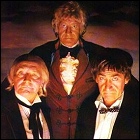 UNIT is called in by a radio astronomer whose studies have turned up distinctly unearthly results of late, but even the Doctor can’t imagine the magnitude of the threat. Somewhere within a black hole, a gateway to an antimatter universe, a malevolent being seeks one of his own race to assume his place as the master of a doomed world – and locates a fellow Time Lord on Earth. When the Doctor realizes the nature of the threat, he sends a distress call to the Time Lords, but their power source is also being drained by the black hole, and they can spare no help – aside from sending the Doctor’s earlier incarnations into his own present. The first Doctor is trapped in a time eddy, barely able to contact his future selves, who travel into the black hole – along with Jo, the Brigadier, and Sergeant Benton – to defy the wrath of Omega…the first Time Lord himself.
UNIT is called in by a radio astronomer whose studies have turned up distinctly unearthly results of late, but even the Doctor can’t imagine the magnitude of the threat. Somewhere within a black hole, a gateway to an antimatter universe, a malevolent being seeks one of his own race to assume his place as the master of a doomed world – and locates a fellow Time Lord on Earth. When the Doctor realizes the nature of the threat, he sends a distress call to the Time Lords, but their power source is also being drained by the black hole, and they can spare no help – aside from sending the Doctor’s earlier incarnations into his own present. The first Doctor is trapped in a time eddy, barely able to contact his future selves, who travel into the black hole – along with Jo, the Brigadier, and Sergeant Benton – to defy the wrath of Omega…the first Time Lord himself.
Season 10 Regular Cast: Jon Pertwee (The Doctor), Katy Manning (Jo Grant)
written by Bob Baker & Dave Martin
directed by Lennie Mayne
music by Dudley SimpsonGuest Cast: Patrick Troughton (The Doctor), William Hartnell (The Doctor), Nicholas Courtney (Brigadier Lethbridge-Stewart), John Levene (Sergeant Benton), Stephen Thorne (Omega), Graham Leaman, Tony Lang, Lincoln Wright, Richard Orme, Peter Evans (Time Lords), Clyde Pollitt (Chancellor), Roy Purcell (President), Laurie Webb (Ollis), Patricia Pryor (Mrs. Ollis), Rex Robinson (Dr. Tyler), Denys Palmer (Palmer), Alan Chuntz (Omega’s champion), Cy Town, Ricky Newby, John Scott Martin, Murphy Grumbar (Gell-guards)
Broadcast from December 30, 1972 through January 20, 1973
LogBook entry & review by Earl Green
Review: As much of a must-see story as The Five Doctors a decade later, The Three Doctors was the first anniversary special in the history of Doctor Who, and featured the rather inevitable storyline of the various Doctors teaming up to fight a common enemy. Patrick Troughton stole much of the show, but my biggest peeve is with the fact that William Hartnell’s final performance – given under the strain of suffering from multiple sclerosis which took his life two years later – is obscured behind the glare of a television monitor. Surely his brief scenes  could have been edited directly into the show, rather than appearing on fuzzy TV screens in the TARDIS? There’s also a priceless reaction from Sergeant Benton, and later the Brigadier, as both are seen walking into the TARDIS for the first time.
could have been edited directly into the show, rather than appearing on fuzzy TV screens in the TARDIS? There’s also a priceless reaction from Sergeant Benton, and later the Brigadier, as both are seen walking into the TARDIS for the first time.
The Three Doctors also sports one of the most traditional-sounding musical underscores Dudley Simpson created during the Pertwee era, but thanks to whoever edited the show, the music is chopped to bits repeatedly, cutting in and out abruptly in a way that reminds me of good old-fashioned cassette tape “pause button” editing. It’s some of the more interesting third Doctor era music, and seems to begin and end jarringly throughout the show, epsecially the eerie bits which set the mood on Omega’s world.
Omega himself is the Pertwee era’s most significant contribution to the Time Lord mythos (aside from the Master), and his legend would be built upon in later years, and especially in the New Adventures. The Time Lords were seen much as they were in The War Games in 1969 – inhabitants of a glittering, hi-tech world, and still contemptuous of the Doctor in all of his incarnations.

